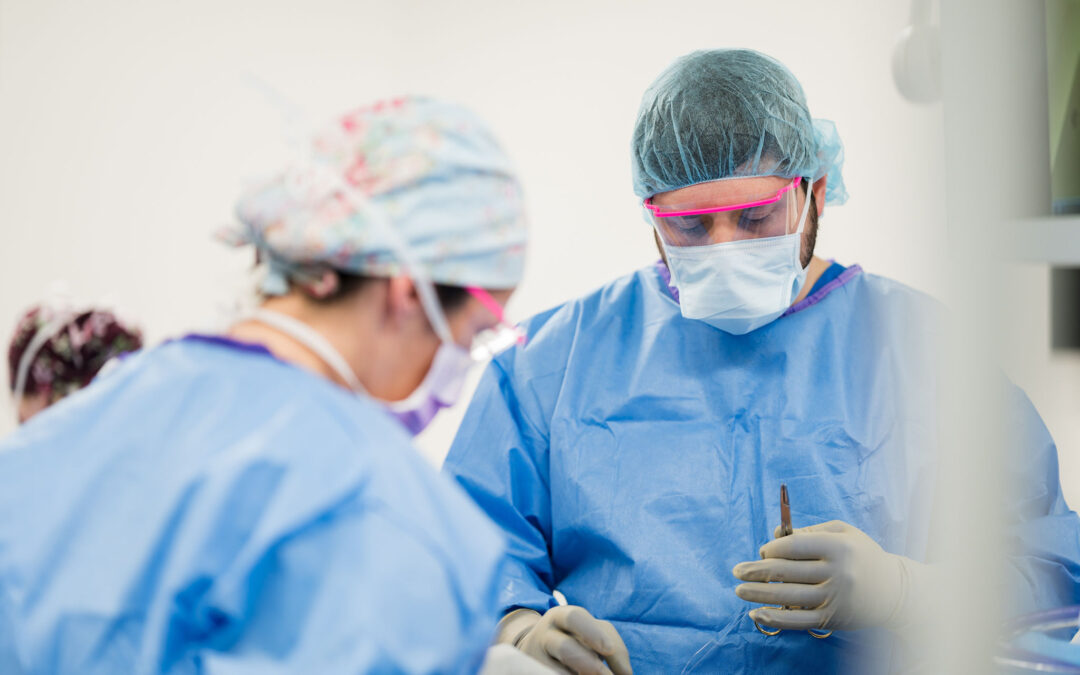What is a Lobectomy?
Lobectomies are a type of lung surgery where the surgeon removes a lobe of the lung. Removing a large portion of the lung may seem like an extensive treatment option, but sometimes it’s essential for the health of the patient.
A lobectomy is a generally safe procedure that treats more serious forms of different lung diseases. Thankfully, there are also options for robotic lung surgery which are less invasive and can reduce your recovery time. Learn when to seek a lobectomy and how this treatment treats each lung problem.
Cancer
One of the most common reasons to remove a portion of the lung is to treat or assist in treating certain types of lung cancer. Often, small-cell lung cancer usually cannot be treated with lobectomy because of their aggressive nature. In contrast, lobectomies have proven effective when performed on less-aggressive large-cell lung cancers.
Detecting cancer early gives lung lobe removal surgery the best rate of success. The danger of this cancer comes from its natural ability to spread from the lungs and damage the rest of the body. When finally detected, advanced forms of this cancer affect several lobes in the lungs. When this happens, your surgeon no longer has the option to remove just one lobe. Therefore, the treatments will be more intense and aggressive.
Abscess
The presence of a foreign body in the lungs sometimes causes infection. Other causes of infection in the lungs, including pneumonia, can lead to the formation of an abscess. An abscess forms when infection lingers, and as it forms, the infection begins to attack healthy tissue.
In terms of treatment, a doctor will drain the abscess and treat it with antibiotics. Treating an abscess this way allows the patient to avoid additional surgery. However, if an abscess becomes severe, it will require additional surgery. Additionally, if the abscess has started to cause widespread infection in the lungs, a patient might need a lobectomy or a partial lobectomy to remove the abscess and the affected tissue.
Emphysema
Emphysema, or chronic obstructive pulmonary disease (COPD), is a disease characterized by progressive damage to the lung tissue. The alveoli in the lungs get progressive damage as the tissue thins, and you suffer increased breathing difficulty and reduced blood oxygenation as a result of this condition.
There is no cure for COPD, but it can be managed with medications and some surgeries, and lobectomy is one of those surgeries. This type of lobectomy is called lung volume reduction surgery, which helps with emphysema. The surgeon removes about a third of the most damaged lung tissue, which helps someone breathe more easily while easing the stress on the diaphragm.
In order to be a good candidate for lung volume reduction surgery, the patient must have good enough health to undergo the procedure and cannot be a current smoker. Because smoking usually causes emphysema, patients who still smoke cannot receive surgical treatment until they stop smoking.
Other Tumors
People can also develop non-cancerous tumors. These benign tumors are not a malignant threat to the body because they won’t metastasize as cancerous tumors do. However, they still cause issues when they form in the lungs because they can restrict lung expansion and place pressure on essential blood vessels that supply oxygen to your lung tissues.
Sometimes, these tumors cannot be removed without removing additional lung tissue. Lobectomy is then the only option, but if you are reasonably healthy, you should fully recover from the loss.
Damage from Infection
Your lungs can become damaged by different types of infection. Abscesses, as discussed above, are only one type of infectious complication. You might also, for example, have fungal deposits in the lungs from a fungal infection. These can cause permanent damage to the lungs, and removing them with the affected lobe of the lung might be the only option for treatment.
Tuberculosis
Another reason why you might need a lobectomy is tuberculosis. While uncommon in the United States, people can still contract TB outside of the States and notice it later.
Specifically, TB is an infection caused by airborne bacteria. However, people don’t normally contract TB when they have a healthy immune system. The bacteria can be latent in the body, causing no symptoms. People with latent TB are not contagious, but they can contract the disease later as their immune system weakens because of illness or age.
Usually, TB can be treated with drugs, but some strains of tuberculosis are resistant to drug treatment, so surgical resection and chemotherapy can be used together to help provide the right course of treatment.
More common strains of TB damage healthy lung tissue if they are not fully treated. The damage to the lungs is permanent, and sometimes a lobectomy helps rectify some of the damage and make it easier for an affected patient to breathe.
Helping Someone Who Just Had a Lobectomy
Recovering from a lobectomy can be challenging, and support from friends, family, and healthcare professionals is crucial. Here’s how you can help someone who has just had a lobectomy:
-
Be supportive: Offer emotional support and reassurance. Understand that the person may be experiencing fear, anxiety, and discomfort during the recovery process. Let them know you are there for them.
-
Help with daily activities: After a lobectomy, the person may have limited mobility and strength. Offer to assist with everyday tasks such as cooking, cleaning, grocery shopping, and transportation to medical appointments.
-
Medication management: Help the person keep track of their medications and ensure they take them as prescribed. Some medications may be needed for pain management or to prevent infection.
-
Encourage physical activity: Encourage the person to engage in light physical activities as recommended by their healthcare provider. Simple exercises and regular walks can help improve lung function and overall well-being.
-
Monitor for complications: Keep an eye out for any signs of complications such as infection, fever, shortness of breath, or unusual pain. Report any concerning symptoms to their healthcare team promptly.
-
Provide a comfortable environment: Ensure the person has a comfortable and safe place to rest and recover. Make any necessary modifications to their living space to accommodate their needs.
-
Nutritional support: Help with meal planning and preparation, ensuring they have a well-balanced diet that supports healing and recovery.
-
Offer companionship: Spending time with the person can help alleviate feelings of loneliness and isolation during recovery.
-
Assist with breathing exercises: Encourage and assist with any breathing exercises or pulmonary rehabilitation exercises recommended by their healthcare provider.
-
Communicate with healthcare professionals: Be involved in the person’s healthcare journey by attending medical appointments with them and asking questions to better understand their condition and treatment plan.
-
Be patient: Understand that recovery from a lobectomy can take time, and there may be setbacks along the way. Be patient and supportive throughout the process.
-
Emotional support: Be a good listener and offer empathy. The person may have concerns about their future health, so it’s essential to provide a safe space for them to express their feelings and fears.
Remember that every individual’s recovery experience is unique, and it’s essential to communicate openly with the person who had the lobectomy to understand their specific needs and preferences. Additionally, consult with their healthcare team for guidance on how best to support their recovery journey.
Talk to a Surgeon
For more information on lung surgery for cancer or lung complaints, contact us at The Surgical Clinic. We will walk you through the possible solutions and advise you on whether a lobectomy is right for you.
Find a surgical oncologist in Greater Nashville

Dr. Mariana Chavez
Surgical Oncologist
Downtown Nashville

Dr. Richard Geer
Surgical Oncology
Downtown

Dr. William Polk
Surgical Oncologist
Downtown

Dr. Patrick Wolf
Surgical Oncologist
Saint Thomas West
General surgeons in Greater Nashville

Dr. John Boskind
General Surgeon
MT. JULIET

Dr. Mariana Chavez
General Surgeon
Downtown

Dr. Patrick Davis
General Surgeon
SOUTHERN HILLS

Dr. Gretchen Edwards
General Surgeon
DOWNTOWN

Dr. Alex Fruin
General Surgeon
MT. JULIET

Dr. James Griscom
General Surgeon
NASHVILLE

Dr. Mark Hinson
General Surgeon
COLUMBIA

Dr. George Lynch
General Surgeon
NASHVILLE

Dr. Clinton Marlar
General Surgeon
SKYLINE

Dr. Willie Melvin
General Surgeon
SMYRNA

Dr. Chad Moss
General Surgeon
COLUMBIA

Dr. William Polk
General Surgeon
NASHVILLE

Dr. Drew Reynolds
General Surgeon
SAINT THOMAS WEST

Dr. Joshua Taylor
General Surgeon
SMYRNA

Dr. Davidson Oxley
General Surgeon
COLUMBIA

Dr. Tyson Thomas
General Surgeon
SAINT THOMAS WEST

Dr. John Valentine
General Surgeon
HENDERSONVILLE

Dr. Patrick Wolf
General Surgeon
SAINT THOMAS WOLF

